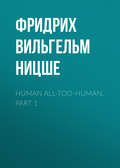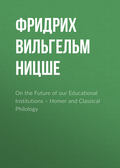
Фридрих Вильгельм Ницше
Beyond Good and Evil
Hail, ye worthies, barrow-wheeling,
"Longer – better," aye revealing,
Stiffer aye in head and knee;
Unenraptured, never jesting,
Mediocre everlasting,
SANS GENIE ET SANS ESPRIT!
229. In these later ages, which may be proud of their humanity, there still remains so much fear, so much SUPERSTITION of the fear, of the "cruel wild beast," the mastering of which constitutes the very pride of these humaner ages – that even obvious truths, as if by the agreement of centuries, have long remained unuttered, because they have the appearance of helping the finally slain wild beast back to life again. I perhaps risk something when I allow such a truth to escape; let others capture it again and give it so much "milk of pious sentiment" [FOOTNOTE: An expression from Schiller's William Tell, Act IV, Scene 3.] to drink, that it will lie down quiet and forgotten, in its old corner. – One ought to learn anew about cruelty, and open one's eyes; one ought at last to learn impatience, in order that such immodest gross errors – as, for instance, have been fostered by ancient and modern philosophers with regard to tragedy – may no longer wander about virtuously and boldly. Almost everything that we call "higher culture" is based upon the spiritualising and intensifying of CRUELTY – this is my thesis; the "wild beast" has not been slain at all, it lives, it flourishes, it has only been – transfigured. That which constitutes the painful delight of tragedy is cruelty; that which operates agreeably in so-called tragic sympathy, and at the basis even of everything sublime, up to the highest and most delicate thrills of metaphysics, obtains its sweetness solely from the intermingled ingredient of cruelty. What the Roman enjoys in the arena, the Christian in the ecstasies of the cross, the Spaniard at the sight of the faggot and stake, or of the bull-fight, the present-day Japanese who presses his way to the tragedy, the workman of the Parisian suburbs who has a homesickness for bloody revolutions, the Wagnerienne who, with unhinged will, "undergoes" the performance of "Tristan and Isolde" – what all these enjoy, and strive with mysterious ardour to drink in, is the philtre of the great Circe "cruelty." Here, to be sure, we must put aside entirely the blundering psychology of former times, which could only teach with regard to cruelty that it originated at the sight of the suffering of OTHERS: there is an abundant, super-abundant enjoyment even in one's own suffering, in causing one's own suffering – and wherever man has allowed himself to be persuaded to self-denial in the RELIGIOUS sense, or to self-mutilation, as among the Phoenicians and ascetics, or in general, to desensualisation, decarnalisation, and contrition, to Puritanical repentance-spasms, to vivisection of conscience and to Pascal-like SACRIFIZIA DELL' INTELLETO, he is secretly allured and impelled forwards by his cruelty, by the dangerous thrill of cruelty TOWARDS HIMSELF. – Finally, let us consider that even the seeker of knowledge operates as an artist and glorifier of cruelty, in that he compels his spirit to perceive AGAINST its own inclination, and often enough against the wishes of his heart: – he forces it to say Nay, where he would like to affirm, love, and adore; indeed, every instance of taking a thing profoundly and fundamentally, is a violation, an intentional injuring of the fundamental will of the spirit, which instinctively aims at appearance and superficiality, – even in every desire for knowledge there is a drop of cruelty.
230. Perhaps what I have said here about a "fundamental will of the spirit" may not be understood without further details; I may be allowed a word of explanation. – That imperious something which is popularly called "the spirit," wishes to be master internally and externally, and to feel itself master; it has the will of a multiplicity for a simplicity, a binding, taming, imperious, and essentially ruling will. Its requirements and capacities here, are the same as those assigned by physiologists to everything that lives, grows, and multiplies. The power of the spirit to appropriate foreign elements reveals itself in a strong tendency to assimilate the new to the old, to simplify the manifold, to overlook or repudiate the absolutely contradictory; just as it arbitrarily re-underlines, makes prominent, and falsifies for itself certain traits and lines in the foreign elements, in every portion of the "outside world." Its object thereby is the incorporation of new "experiences," the assortment of new things in the old arrangements – in short, growth; or more properly, the FEELING of growth, the feeling of increased power – is its object. This same will has at its service an apparently opposed impulse of the spirit, a suddenly adopted preference of ignorance, of arbitrary shutting out, a closing of windows, an inner denial of this or that, a prohibition to approach, a sort of defensive attitude against much that is knowable, a contentment with obscurity, with the shutting-in horizon, an acceptance and approval of ignorance: as that which is all necessary according to the degree of its appropriating power, its "digestive power," to speak figuratively (and in fact "the spirit" resembles a stomach more than anything else). Here also belong an occasional propensity of the spirit to let itself be deceived (perhaps with a waggish suspicion that it is NOT so and so, but is only allowed to pass as such), a delight in uncertainty and ambiguity, an exulting enjoyment of arbitrary, out-of-the-way narrowness and mystery, of the too-near, of the foreground, of the magnified, the diminished, the misshapen, the beautified – an enjoyment of the arbitrariness of all these manifestations of power. Finally, in this connection, there is the not unscrupulous readiness of the spirit to deceive other spirits and dissemble before them – the constant pressing and straining of a creating, shaping, changeable power: the spirit enjoys therein its craftiness and its variety of disguises, it enjoys also its feeling of security therein – it is precisely by its Protean arts that it is best protected and concealed! – COUNTER TO this propensity for appearance, for simplification, for a disguise, for a cloak, in short, for an outside – for every outside is a cloak – there operates the sublime tendency of the man of knowledge, which takes, and INSISTS on taking things profoundly, variously, and thoroughly; as a kind of cruelty of the intellectual conscience and taste, which every courageous thinker will acknowledge in himself, provided, as it ought to be, that he has sharpened and hardened his eye sufficiently long for introspection, and is accustomed to severe discipline and even severe words. He will say: "There is something cruel in the tendency of my spirit": let the virtuous and amiable try to convince him that it is not so! In fact, it would sound nicer, if, instead of our cruelty, perhaps our "extravagant honesty" were talked about, whispered about, and glorified – we free, VERY free spirits – and some day perhaps SUCH will actually be our – posthumous glory! Meanwhile – for there is plenty of time until then – we should be least inclined to deck ourselves out in such florid and fringed moral verbiage; our whole former work has just made us sick of this taste and its sprightly exuberance. They are beautiful, glistening, jingling, festive words: honesty, love of truth, love of wisdom, sacrifice for knowledge, heroism of the truthful – there is something in them that makes one's heart swell with pride. But we anchorites and marmots have long ago persuaded ourselves in all the secrecy of an anchorite's conscience, that this worthy parade of verbiage also belongs to the old false adornment, frippery, and gold-dust of unconscious human vanity, and that even under such flattering colour and repainting, the terrible original text HOMO NATURA must again be recognized. In effect, to translate man back again into nature; to master the many vain and visionary interpretations and subordinate meanings which have hitherto been scratched and daubed over the eternal original text, HOMO NATURA; to bring it about that man shall henceforth stand before man as he now, hardened by the discipline of science, stands before the OTHER forms of nature, with fearless Oedipus-eyes, and stopped Ulysses-ears, deaf to the enticements of old metaphysical bird-catchers, who have piped to him far too long: "Thou art more! thou art higher! thou hast a different origin!" – this may be a strange and foolish task, but that it is a TASK, who can deny! Why did we choose it, this foolish task? Or, to put the question differently: "Why knowledge at all?" Every one will ask us about this. And thus pressed, we, who have asked ourselves the question a hundred times, have not found and cannot find any better answer…
231. Learning alters us, it does what all nourishment does that does not merely "conserve" – as the physiologist knows. But at the bottom of our souls, quite "down below," there is certainly something unteachable, a granite of spiritual fate, of predetermined decision and answer to predetermined, chosen questions. In each cardinal problem there speaks an unchangeable "I am this"; a thinker cannot learn anew about man and woman, for instance, but can only learn fully – he can only follow to the end what is "fixed" about them in himself. Occasionally we find certain solutions of problems which make strong beliefs for us; perhaps they are henceforth called "convictions." Later on – one sees in them only footsteps to self-knowledge, guide-posts to the problem which we ourselves ARE – or more correctly to the great stupidity which we embody, our spiritual fate, the UNTEACHABLE in us, quite "down below." – In view of this liberal compliment which I have just paid myself, permission will perhaps be more readily allowed me to utter some truths about "woman as she is," provided that it is known at the outset how literally they are merely – MY truths.
232. Woman wishes to be independent, and therefore she begins to enlighten men about "woman as she is" – THIS is one of the worst developments of the general UGLIFYING of Europe. For what must these clumsy attempts of feminine scientificality and self-exposure bring to light! Woman has so much cause for shame; in woman there is so much pedantry, superficiality, schoolmasterliness, petty presumption, unbridledness, and indiscretion concealed – study only woman's behaviour towards children! – which has really been best restrained and dominated hitherto by the FEAR of man. Alas, if ever the "eternally tedious in woman" – she has plenty of it! – is allowed to venture forth! if she begins radically and on principle to unlearn her wisdom and art-of charming, of playing, of frightening away sorrow, of alleviating and taking easily; if she forgets her delicate aptitude for agreeable desires! Female voices are already raised, which, by Saint Aristophanes! make one afraid: – with medical explicitness it is stated in a threatening manner what woman first and last REQUIRES from man. Is it not in the very worst taste that woman thus sets herself up to be scientific? Enlightenment hitherto has fortunately been men's affair, men's gift – we remained therewith "among ourselves"; and in the end, in view of all that women write about "woman," we may well have considerable doubt as to whether woman really DESIRES enlightenment about herself – and CAN desire it. If woman does not thereby seek a new ORNAMENT for herself – I believe ornamentation belongs to the eternally feminine? – why, then, she wishes to make herself feared: perhaps she thereby wishes to get the mastery. But she does not want truth – what does woman care for truth? From the very first, nothing is more foreign, more repugnant, or more hostile to woman than truth – her great art is falsehood, her chief concern is appearance and beauty. Let us confess it, we men: we honour and love this very art and this very instinct in woman: we who have the hard task, and for our recreation gladly seek the company of beings under whose hands, glances, and delicate follies, our seriousness, our gravity, and profundity appear almost like follies to us. Finally, I ask the question: Did a woman herself ever acknowledge profundity in a woman's mind, or justice in a woman's heart? And is it not true that on the whole "woman" has hitherto been most despised by woman herself, and not at all by us? – We men desire that woman should not continue to compromise herself by enlightening us; just as it was man's care and the consideration for woman, when the church decreed: mulier taceat in ecclesia. It was to the benefit of woman when Napoleon gave the too eloquent Madame de Stael to understand: mulier taceat in politicis! – and in my opinion, he is a true friend of woman who calls out to women today: mulier taceat de mulierel.
233. It betrays corruption of the instincts – apart from the fact that it betrays bad taste – when a woman refers to Madame Roland, or Madame de Stael, or Monsieur George Sand, as though something were proved thereby in favour of "woman as she is." Among men, these are the three comical women as they are – nothing more! – and just the best involuntary counter-arguments against feminine emancipation and autonomy.
234. Stupidity in the kitchen; woman as cook; the terrible thoughtlessness with which the feeding of the family and the master of the house is managed! Woman does not understand what food means, and she insists on being cook! If woman had been a thinking creature, she should certainly, as cook for thousands of years, have discovered the most important physiological facts, and should likewise have got possession of the healing art! Through bad female cooks – through the entire lack of reason in the kitchen – the development of mankind has been longest retarded and most interfered with: even today matters are very little better. A word to High School girls.
235. There are turns and casts of fancy, there are sentences, little handfuls of words, in which a whole culture, a whole society suddenly crystallises itself. Among these is the incidental remark of Madame de Lambert to her son: "MON AMI, NE VOUS PERMETTEZ JAMAIS QUE DES FOLIES, QUI VOUS FERONT GRAND PLAISIR" – the motherliest and wisest remark, by the way, that was ever addressed to a son.
236. I have no doubt that every noble woman will oppose what Dante and Goethe believed about woman – the former when he sang, "ELLA GUARDAVA SUSO, ED IO IN LEI," and the latter when he interpreted it, "the eternally feminine draws us ALOFT"; for THIS is just what she believes of the eternally masculine.
237. SEVEN APOPHTHEGMS FOR WOMEN
How the longest ennui flees, When a man comes to our knees!
Age, alas! and science staid, Furnish even weak virtue aid.
Sombre garb and silence meet: Dress for every dame – discreet.
Whom I thank when in my bliss? God! – and my good tailoress!
Young, a flower-decked cavern home; Old, a dragon thence doth roam.
Noble title, leg that's fine, Man as well: Oh, were HE mine!
Speech in brief and sense in mass – Slippery for the jenny-ass!
237A. Woman has hitherto been treated by men like birds, which, losing their way, have come down among them from an elevation: as something delicate, fragile, wild, strange, sweet, and animating – but as something also which must be cooped up to prevent it flying away.
238. To be mistaken in the fundamental problem of "man and woman," to deny here the profoundest antagonism and the necessity for an eternally hostile tension, to dream here perhaps of equal rights, equal training, equal claims and obligations: that is a TYPICAL sign of shallow-mindedness; and a thinker who has proved himself shallow at this dangerous spot – shallow in instinct! – may generally be regarded as suspicious, nay more, as betrayed, as discovered; he will probably prove too "short" for all fundamental questions of life, future as well as present, and will be unable to descend into ANY of the depths. On the other hand, a man who has depth of spirit as well as of desires, and has also the depth of benevolence which is capable of severity and harshness, and easily confounded with them, can only think of woman as ORIENTALS do: he must conceive of her as a possession, as confinable property, as a being predestined for service and accomplishing her mission therein – he must take his stand in this matter upon the immense rationality of Asia, upon the superiority of the instinct of Asia, as the Greeks did formerly; those best heirs and scholars of Asia – who, as is well known, with their INCREASING culture and amplitude of power, from Homer to the time of Pericles, became gradually STRICTER towards woman, in short, more Oriental. HOW necessary, HOW logical, even HOW humanely desirable this was, let us consider for ourselves!
239. The weaker sex has in no previous age been treated with so much respect by men as at present – this belongs to the tendency and fundamental taste of democracy, in the same way as disrespectfulness to old age – what wonder is it that abuse should be immediately made of this respect? They want more, they learn to make claims, the tribute of respect is at last felt to be well-nigh galling; rivalry for rights, indeed actual strife itself, would be preferred: in a word, woman is losing modesty. And let us immediately add that she is also losing taste. She is unlearning to FEAR man: but the woman who "unlearns to fear" sacrifices her most womanly instincts. That woman should venture forward when the fear-inspiring quality in man – or more definitely, the MAN in man – is no longer either desired or fully developed, is reasonable enough and also intelligible enough; what is more difficult to understand is that precisely thereby – woman deteriorates. This is what is happening nowadays: let us not deceive ourselves about it! Wherever the industrial spirit has triumphed over the military and aristocratic spirit, woman strives for the economic and legal independence of a clerk: "woman as clerkess" is inscribed on the portal of the modern society which is in course of formation. While she thus appropriates new rights, aspires to be "master," and inscribes "progress" of woman on her flags and banners, the very opposite realises itself with terrible obviousness: WOMAN RETROGRADES. Since the French Revolution the influence of woman in Europe has DECLINED in proportion as she has increased her rights and claims; and the "emancipation of woman," insofar as it is desired and demanded by women themselves (and not only by masculine shallow-pates), thus proves to be a remarkable symptom of the increased weakening and deadening of the most womanly instincts. There is STUPIDITY in this movement, an almost masculine stupidity, of which a well-reared woman – who is always a sensible woman – might be heartily ashamed. To lose the intuition as to the ground upon which she can most surely achieve victory; to neglect exercise in the use of her proper weapons; to let-herself-go before man, perhaps even "to the book," where formerly she kept herself in control and in refined, artful humility; to neutralize with her virtuous audacity man's faith in a VEILED, fundamentally different ideal in woman, something eternally, necessarily feminine; to emphatically and loquaciously dissuade man from the idea that woman must be preserved, cared for, protected, and indulged, like some delicate, strangely wild, and often pleasant domestic animal; the clumsy and indignant collection of everything of the nature of servitude and bondage which the position of woman in the hitherto existing order of society has entailed and still entails (as though slavery were a counter-argument, and not rather a condition of every higher culture, of every elevation of culture): – what does all this betoken, if not a disintegration of womanly instincts, a defeminising? Certainly, there are enough of idiotic friends and corrupters of woman among the learned asses of the masculine sex, who advise woman to defeminize herself in this manner, and to imitate all the stupidities from which "man" in Europe, European "manliness," suffers, – who would like to lower woman to "general culture," indeed even to newspaper reading and meddling with politics. Here and there they wish even to make women into free spirits and literary workers: as though a woman without piety would not be something perfectly obnoxious or ludicrous to a profound and godless man; – almost everywhere her nerves are being ruined by the most morbid and dangerous kind of music (our latest German music), and she is daily being made more hysterical and more incapable of fulfilling her first and last function, that of bearing robust children. They wish to "cultivate" her in general still more, and intend, as they say, to make the "weaker sex" STRONG by culture: as if history did not teach in the most emphatic manner that the "cultivating" of mankind and his weakening – that is to say, the weakening, dissipating, and languishing of his FORCE OF WILL – have always kept pace with one another, and that the most powerful and influential women in the world (and lastly, the mother of Napoleon) had just to thank their force of will – and not their schoolmasters – for their power and ascendancy over men. That which inspires respect in woman, and often enough fear also, is her NATURE, which is more "natural" than that of man, her genuine, carnivora-like, cunning flexibility, her tiger-claws beneath the glove, her NAIVETE in egoism, her untrainableness and innate wildness, the incomprehensibleness, extent, and deviation of her desires and virtues. That which, in spite of fear, excites one's sympathy for the dangerous and beautiful cat, "woman," is that she seems more afflicted, more vulnerable, more necessitous of love, and more condemned to disillusionment than any other creature. Fear and sympathy it is with these feelings that man has hitherto stood in the presence of woman, always with one foot already in tragedy, which rends while it delights – What? And all that is now to be at an end? And the DISENCHANTMENT of woman is in progress? The tediousness of woman is slowly evolving? Oh Europe! Europe! We know the horned animal which was always most attractive to thee, from which danger is ever again threatening thee! Thy old fable might once more become "history" – an immense stupidity might once again overmaster thee and carry thee away! And no God concealed beneath it – no! only an "idea," a "modern idea"!







